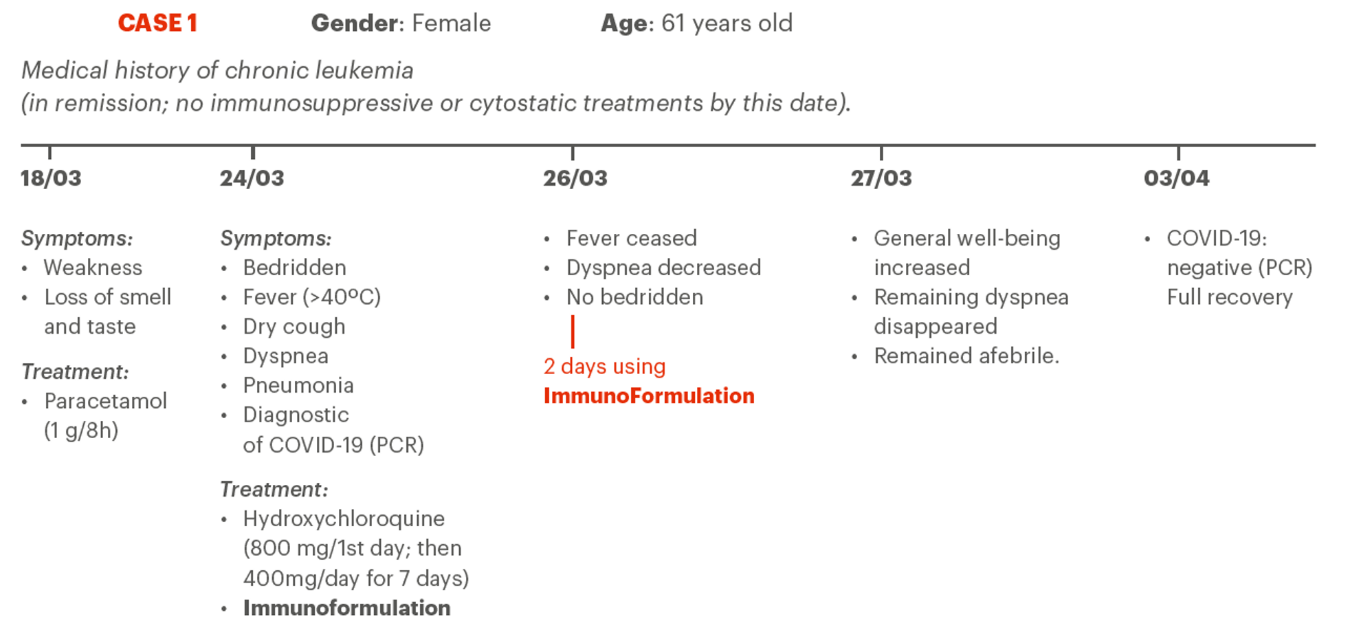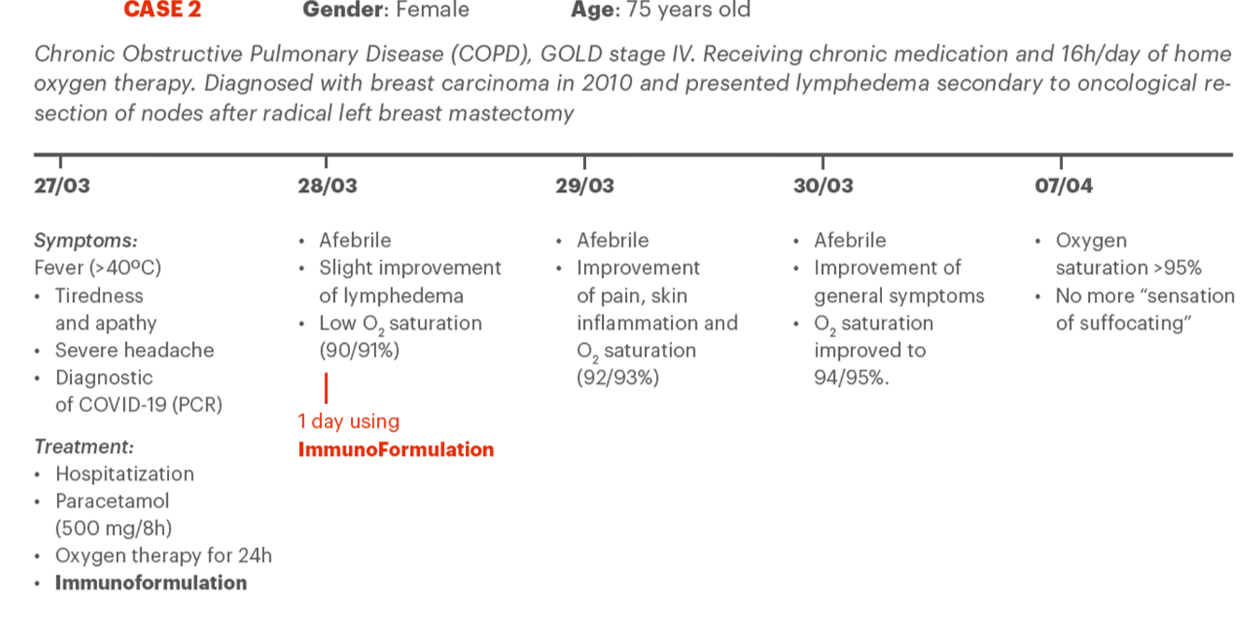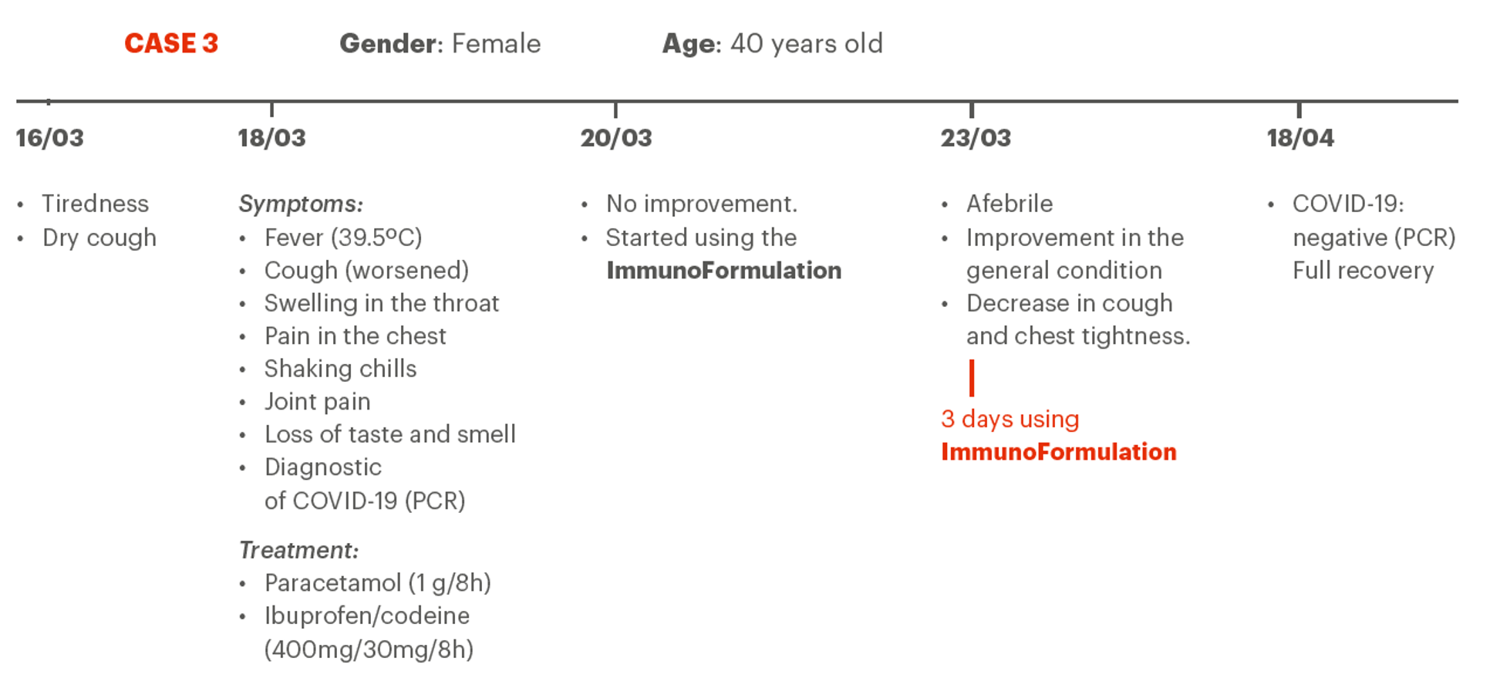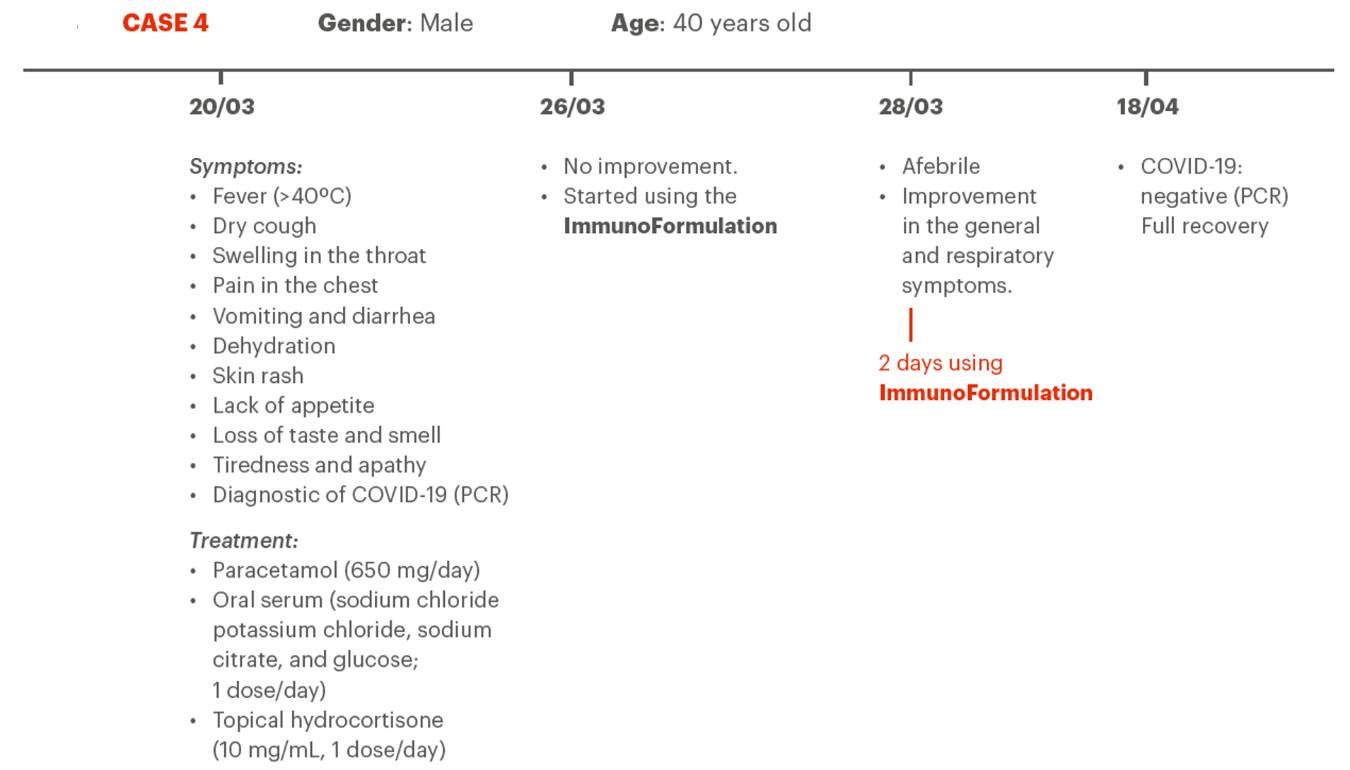
| Version | Summary | Created by | Modification | Content Size | Created at | Operation |
|---|---|---|---|---|---|---|
| 1 | Mariana Díaz | + 1413 word(s) | 1413 | 2020-07-21 11:18:27 | | | |
| 2 | Catherine Yang | Meta information modification | 1413 | 2020-07-22 05:09:43 | | | | |
| 3 | Mariana Díaz | + 2 word(s) | 1415 | 2020-07-27 09:04:07 | | | | |
| 4 | Mariana Díaz | -3 word(s) | 1412 | 2020-07-27 13:12:41 | | | | |
| 5 | Dean Liu | -80 word(s) | 1332 | 2020-10-27 10:53:05 | | | | |
| 6 | Catherine Yang | Meta information modification | 1332 | 2020-11-05 11:47:45 | | |
Video Upload Options
The number of patients infected with the SARS-CoV-2 is still growing worldwide, with no current vaccine or medicinal treatment up to this date. Here we describe the cases of four COVID-19 patients that used a combination of therapeutic/nutraceutical agents for improvement of their symptoms. The ingredients were: immune transfer factor (oligo- and polypeptides fractions from porcine spleen, ultrafiltered at <10 kDa; Imuno TF®), anti-inflammatory natural blend (Uncaria tomentosa, Endopleura uchi and Haematoccocus pluvialis; Miodesin®), zinc, selenium, ascorbic acid, cholecalciferol, ferulic acid, spirulina, N-acetylcysteine, glucosamine sulfate potassium hydrochloride, trans-resveratrol, and maltodextrin-stabilized orthosilicic acid (SiliciuMax®). The four showed improvement in general symptoms after using the combination proposed here. The cases presented here are just a first hint towards its benefit (decreases time necessary for the recovery of the patients), this would be a good starting point to the further investigation of this possible add-on therapy in controlled clinical studies. Limited sample size and study design are limitations for definitive conclusions on the add-on therapy.
1. Conjecture content
Could the administration of a mix of pharmaceutical ingredients (ImmunoFormulation) be beneficial for patients with coronavirus disease 2019 (COVID-19)?
2. Background
The novel coronavirus disease (COVID-19), caused by the severe acute respiratory syndrome coronavirus 2 (SARS-CoV-2), was firstly reported in Wuhan (China) and has now spread worldwide. As of July 20th, the World Health Organization (WHO) reported 14,348,858 cases confirmed, and 603,691 deaths [1]. The number of patients infected is still growing, with no current vaccine or medicinal treatment.
The scientific community has been making significant efforts globally to elucidate the mechanisms of action of SARS-CoV-2, to understand the predisposition of severe cases, and to find possible treatment options. Possible therapeutic options include antiviral drugs, vaccines and other adjuvants agents that could relief symptoms or improve accelerate healing. For the latter, scientists have been focusing their interests on a long list of essential nutrients, herbal extracts, phytochemicals, and other nutraceuticals that might either help to prevent virus entrance in the cells or possibly decrease its replication rate [2][3]. Nutraceuticals are often aimed at improving immune system function, which is important for infectious diseases in general and SARS-CoV-2 in particular. It is believed that decreased immunity is at least partially responsible for the observed increase in morbidity and mortality resulting from infectious agents, including SARS-CoV-2, especially in elderly [4]. Dietary supplementation with specific nutrients that can improve immune defense has been gaining momentum in current days as it is well stablished that the nutritional profile can influence the patient’s immunity and recovery rate [5].
In this regard, we describe here 4 cases of patients with COVID-19 that received a combination of twelve therapeutic/nutraceutical agents to support their treatment of the symptomatology associated with COVID-19. The ingredients were chosen based on literature reports of their effects on (i) regulation of the immune system; (ii) avoidance of virus entrance in the cell; (iii) decrease of virus replication; (iv) control of hyperinflammation; (v) reduction of oxidative stress; (vi) antithrombotic effect; and (vii) protection of the endothelial barrier [6].
3. Results
The four patients used the same combination of therapeutic/nutraceutical agents, from now on referred as “ImmunoFormulation”, which composition was: immune transfer factor (TF) (oligo- and polypeptides from porcine spleen, ultrafiltered at <10 kDa; Imuno TF®) 100 mg, anti-inflammatory natural blend (Uncaria tomentosa, Endopleura uchi and Haematoccocus pluvialis; Miodesin®) – 800 mg, zinc orotate – 60 mg, selenium yeast – 48 mg (equivalent to 96 μg of Se), cholecalciferol – 20,000 IU, ascorbic acid – 300 mg, ferulic acid – 480 mg, trans-resveratrol – 90 mg, spirulina – 800 mg, N-acetylcysteine – 560 mg, glucosamine sulfate potassium hydrochloride – 610 mg, and maltodextrin-stabilized orthosilicic acid (SiliciuMax®) – 400 mg (equivalent to 6 mg of Si). This corresponded to the daily intake, which was divided into 3 doses, taken every 8 hours.
A summary of the clinical progression of the four patients and the treatment given is shown in Figure 1. All patients provided written and signed informed consent for their data to be used.
Figure 1. Clinical history of the two patients treated with the proposed treatment.
To our knowledge, this is the first report on the use of transfer factors and other ingredients for COVID-19 patients. The adjuvant treatment given to the patients was well tolerated with no adverse reactions or discomfort and seemed to have induced faster recovery than would normally be expected, suggesting that the ingredients can play a role in accelerating the body response to the infection through multiple mechanisms.
Imuno TF® was used due to its action regulating interleukins (decrease of IL-6 and increase of IFN-γ, which is a marker for a better prognostic of the patient). TF have shown to be effective in several viral infections and can potentially increase the activation of NK-cells, improving immune response against foreign invaders [7][8][9].
Miodesin® has been used for its ability to decrease immune hyperresponsiveness and inflammation in respiratory conditions and its potential to control the cytokines storm in acute respiratory infections [10]. This is based on a recent study that showed that it can inhibit the release of cytokines (IL-1β, IL-6, IL-8, and TNF-α) and chemokines (CCL2, CCL3, and CCL5), and the expression of NF-κB, inflammatory enzymes (COX-1, COX-2, PLA2, iNOS) and chemokines (CCL2, CCL3, and CCL5) [11].
Additional effects on the immune system are: TF and spirulina can act on macrophage and NK-cells activation through the effects on IFN-? and IL-12/IL-15, respectively [9]. Selenium can stimulate CD8+ lymphocytes [12]. Spirulina, Zn, vitamin C and vitamin D3 may increase the production and development of cells mediating nonspecific immunity, such as neutrophils and lymphocytes 13. TF and Se can trigger CD4+ Th1 cells to produce IFN-γ, IL-1 and TNF-α [9][12][13].
The formulation also contains ingredients with direct antiviral effects: NAC and resveratrol have shown DPP4R inhibitory effect, and resveratrol can block the binding of ACE2 [14][15]. NAC, Se and glucosamine amplify the signaling functions of TLR7 and MAVS in type 1 IFN production, which might help to prevent and control RNA virus infections [3]. Zn has been shown to inhibit the replication of SARS-CoV [16].
Specifically for COVID-19, there is evidence that vitamin D3 may reduce COVID-19 severity by a suppressive effect on the cytokines storm [17]. TF and spirulina have shown potential to decrease IL-6 levels, reducing the overstimulation of the immune system and bringing potential benefits in hyperinflammatory stage of coronaviruses infections [9][18]. Ferulic acid, resveratrol and NAC can promote synthesis of glutathione; and Se is an essential cofactor for certain peroxidases and induce oxidative damage caused by SARS-CoV-2, as could the other nutraceuticals with antioxidant properties such as vitamin C, spirulina and Miodesin® [3][19]. Resveratrol has a potential antithrombotic effect and ferulic acid and a tetracyclic alkaloid from U. tomentosa (present in Miodesin®) can inhibit platelet aggregation and protect endotheliocyte, possibly reducing the COVID-19 cardiovascular thrombotic complications [20][21][22].
Finally, the endotheliitis observed in COVID-19 patients could have been avoided because of the following effects: resveratrol attenuates endothelial inflammation by protecting cells from stressful conditions, which is mediated through the activation of the signaling cAMP-PRKA-AMPK-SIRT1 pathway [23]; Vitamin D3 can be inversely associated with levels of 3-nitrotyrosine and soluble vascular cell adhesion molecule-1 (sVCAM-1), one indicative of decreased nitrosative stress and endothelial activation [24]; Vitamin C stimulates endothelial proliferation, inhibiting apoptosis, scavenging radical species, and sparing cell-derived nitric oxide to help modulate blood flow [25]; and silicon can modify the characteristics of endothelial relaxants and attenuates smooth muscle cell responsiveness to nitric oxide (NO) [26].
The main limitation of this study is that it reports only a small case series that included no controls. It could also not be determined if the patients would have improved without the use of the formulation proposed, or even if they would not develop critical symptoms. Additionally, the patients were treated with multiple other agents, therefore the improvement observed could have been a result of the synergistic effect between the formulation and these treatments.
To summarize, the four COVID-19 patients showed improvement in general symptoms after using the “Immuno Formulation” proposed here. The cases presented here are just a first hint towards its benefit (decreases time necessary for the recovery of the patients), and require further investigation of this possible add-on therapy in controlled clinical studies, with large sample size.
References
- Coronavirus disease 2019 (COVID-19) Situation Report 182. . World Health Organization. Retrieved 2020-7-21
- Guangdi Li; Erik De Clercq; Therapeutic options for the 2019 novel coronavirus (2019-nCoV). Nature Reviews Drug Discovery 2020, 19, 149-150, 10.1038/d41573-020-00016-0.
- Mark F. Mccarty; James J DiNicolantonio; Nutraceuticals have potential for boosting the type 1 interferon response to RNA viruses including influenza and coronavirus.. Progress in Cardiovascular Diseases 2020, x, Epub ahead of print., 10.1016/j.pcad.2020.02.007.
- Barry W. Ritz; Elizabeth M. Gardner; Malnutrition and Energy Restriction Differentially Affect Viral Immunity. The Journal of Nutrition 2006, 136, 1141-1144, 10.1093/jn/136.5.1141.
- Iftikhar Alam; Ali M. Almajwal; Wajid Alam; Ibrar Alam; Niamat Ullah; Mahmoud Abulmeaaty; Suhail Razak; Saleem Khan; Graham Pawelec; Parvez Iqbal Paracha; et al. The immune-nutrition interplay in aging – facts and controversies. Nutrition and Healthy Aging 2019, 5, 73-95, 10.3233/nha-170034.
- Ferreira AO, Polonini HC, Djikers ECF. Postulated add-on therapeutic strategies for COVID-19. Journal of Personalized Medicine. Under review.
- D Viza; H H Fudenberg; A Palareti; D Ablashi; C De Vinci; G Pizza; Transfer factor: an overlooked potential for the prevention and treatment of infectious diseases.. Folia Biologica 2013, 59, 53-67.
- C H Kirkpatrick; Activities and characteristics of transfer factors.. Biotherapy 1996, 9, 13-16.
- Marimuthu Krishnaveni; A review on transfer factor an immune modulator. Drug Invention Today 2013, 5, 153-156, 10.1016/j.dit.2013.04.002.
- Bruna Cestari De Azevedo; Lucas Junqueira De Freitas Morel; Fabio Carmona; Thiago Mattar Cunha; Silvia Helena Taleb Contini; Piero Giuseppe Delprete; Fernando S. Ramalho; Eduardo Crevelin; Bianca Waléria Bertoni; Suzelei Castro França; et al.Marcos BorgesAna Maria S. Pereira Aqueous extracts from Uncaria tomentosa (Willd. ex Schult.) DC. reduce bronchial hyperresponsiveness and inflammation in a murine model of asthma. Journal of Ethnopharmacology 2018, 218, 76-89, 10.1016/j.jep.2018.02.013.
- Carlos R. Oliveira; Rodolfo Paula Vieira; Anti-Inflammatory Activity of Miodesin™: Modulation of Inflammatory Markers and Epigenetic Evidence. Oxidative Medicine and Cellular Longevity 2020, 2020, 1-11, 10.1155/2020/6874260.
- Peter R. Hoffmann; Marla J. Berry; The influence of selenium on immune responses.. Molecular Nutrition & Food Research 2008, 52, 1273-80, 10.1002/mnfr.200700330.
- Cicero, Arrigo; Colletti, Alessandro. Handbook of Nutraceuticals for Clinical Use; Springer: Switzerland, 2018; pp. 219p..
- Cheng, J.; Tang, Y.; Bao, B.; Zhang, P.; Exploring the active compounds of traditional mongolian medicine agsirga in intervention of novel Coronavirus (2019-nCoV) based on HPLC-Q-Exactive-MS/MS and molecular docking method. ChemRxiv 2020, x, 1-31.
- Laskar, Monjur; Choudhury, Manabendra; Resveratrol A Potent Angiotensin Converting Enzyme Inhibitor: A Computational Study in Relevance to Cardioprotective Activity. Research Journal of Pharmaceutical, Biological and Chemical Sciences 2014, 5, 1109-1115.
- Aartjan J. W. Te Velthuis; Sjoerd H. E. Van Den Worm; Amy C. Sims; Ralph S. Baric; Eric J. Snijder; Martijn J. Van Hemert; Zn2+ Inhibits Coronavirus and Arterivirus RNA Polymerase Activity In Vitro and Zinc Ionophores Block the Replication of These Viruses in Cell Culture. PLoS Pathogens 2010, 6, e1001176, 10.1371/journal.ppat.1001176.
- Ali Daneshkhah; Vasundhara Agrawal; Adam Eshein; Hariharan Subramanian; Hemant Kumar Roy; Vadim Backman; The Role of Vitamin D in Suppressing Cytokine Storm and Associated Mortality in COVID-19 Patients. medRxiv 2020, x, 1-20, 10.1101/2020.04.08.20058578.
- Hee Jung Park; Yun Jung Lee; Han Kyoung Ryu; Mi‐Hyun Kim; Hye Won Chung; Wha Young Kim; A Randomized Double-Blind, Placebo-Controlled Study to Establish the Effects of Spirulina in Elderly Koreans. Annals of Nutrition and Metabolism 2008, 52, 322-328, 10.1159/000151486.
- Mirtha Mavarro; Elizabeth Arnáez Serrano; Ileana Moreira; Alonso Hurtado Bolanos; Daniela Monge; María Monagas; Polyphenolic Composition and Antioxidant Activity of Uncaria tomentosa Commercial Bark Products.. Antioxidants 2019, 8, 339, 10.3390/antiox8090339.
- Zhenkai Lou; Kaili Du; Tingting Wang; Xueling Zhao; Xingguo Li; Bing Wang; Resveratrol suppresses P-selectin, PSGL-1, and VWF through SIRT1 signaling pathway. Acta Biochimica et Biophysica Sinica 2017, 49, 848-850, 10.1093/abbs/gmx077.
- Shao Shuai; Yue Gao; Ferulic Acid, A Potential Antithrombotic Drug. Journal of Lung Health and Diseases 2018, 2, 25-28, 10.29245/2689-999x/2017/2.1127.
- EMEA - European Medicines Agency. Assessment report on Uncaria tomentosa (Willd. ex Schult.) DC., cortex. 2015. 67p.
- Bernardita Monsalve; Aníbal Concha-Meyer; Iván Palomo; Eduardo Fuentes; Mechanisms of Endothelial Protection by Natural Bioactive Compounds from Fruit and Vegetables. Anais da Academia Brasileira de Ciências 2017, 89, 615-633, 10.1590/0001-3765201720160509.
- Rinkoo Dalan; Huiling Liew; Wai Kit Alvin Tan; Daniel E.K. Chew; Melvin Khee-Shing Leow; Vitamin D and the endothelium: basic, translational and clinical research updates. IJC Metabolic & Endocrine 2014, 4, 4-17, 10.1016/j.ijcme.2014.06.003.
- James M. May; Fiona E. Harrison; Role of Vitamin C in the Function of the Vascular Endothelium. Antioxidants & Redox Signaling 2013, 19, 2068-2083, 10.1089/ars.2013.5205.
- Gülsen Öner; Selma Cirrik; Mehmet Bülbül; Selahattin Yuksel; Dietary Silica Modifies the Characteristics of Endothelial Dilation in Rat Aorta. Endothelium 2006, 13, 17-23, 10.1080/10623320600660045.









